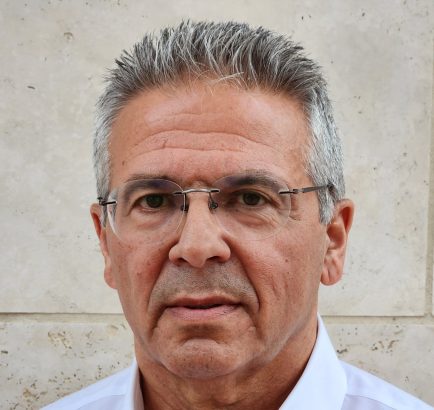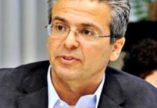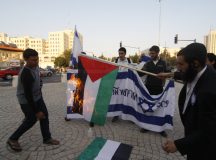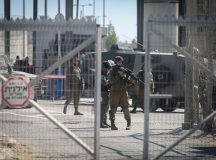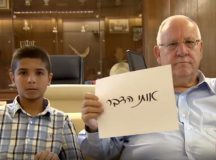Mike Prashker founded MERCHAVIM: The Institute for the Advancement of Shared Citizenship in Israel in 1998 and directed the NGO for 17 years before joining the Board of Directors. He is the author of A Place for Us All, Social Cohesion and the Future of Israel (2017). He currently leads the Social Cohesion Leadership Program, an initiative of the Ted Arison Family Foundation, Ruach Tova and Merchavim.
Introduction
In the wake of 7 October many policy makers and public servants, NGO leaders and philanthropists in Israel and internationally are turning to address critical aspects of individual and communal resilience.
The needs remain incalculable and extensive investments will be required for years. The scale of direct individual trauma, loss and dislocation triggered by Hamas’s brutal attack is enormous and still accumulating. This is even before beginning to address the great collective trauma, damage and loss suffered by all Israelis and the State.
Without in any way mitigating Hamas’s responsibility for the horror, including the suffering its leaders inevitably caused innocent Gazans, the catastrophic Israeli failures – of government, security, society and democracy – that contributed to the scale of the disaster greatly complicate and even jeopardise effective responses.
To rebuild personal and communal resilience it is imperative to simultaneously work to strengthen social cohesion grounded in a mature democratic culture.
This dependency derives from the fact that individuals and communities do not exist in isolation, certainly not in a country as small and crowded as Israel. Individual and communal fates are umbilically connected to the circumstances and health of the societies in which they dwell.
Strengthening Israel’s social cohesion – improving the prospects of a more successful shared future for all Israel’s citizens – depends on promoting a specific set of geo-political, socioeconomic, psychological and cultural conditions. Almost all have been wantonly or neglectfully eroded by successive Netanyahu governments, none more so than the foundational condition of a mature democratic culture. While the extent to which this erosion contributed to the scale of the disaster is politically contested, strengthening all these conditions is essential to recovery.
This essay sets out to encourage a conversation among stakeholders about the relationship between individual and communal resilience, social cohesion and democracy. It aims to highlight how the erosion or strengthening of conditions conducive to social cohesion impacts on individual and collective resilience. Finally, it seeks to encourage the development of integrated win-win change strategies and collaborations across these inter-dependent fields.
The proposed conversation is understandably still largely to be had. The war rages on and there is a tsunami of emergency needs at the individual and communal levels. But much like public and political debate about “the day after the war” it cannot be put off indefinitely.
Defining the three concepts: individual resilience, communal resilience and social cohesion
While there are nuances among theorists and practitioners, the concept of individual resilience is widely understood to relate to the psychological ability of a person to face, adapt, overcome, recover and even grow from adversity. It generally includes emotional, cognitive, behavioral, inter-personal and physical elements in response to crisis, loss and trauma. In post-7 October Israel, it must certainly include the provision of extensive psychological and social services to hundreds of thousands of civilians and many tens of thousands of soldiers, first-responders and caregivers.
The concept of communal resilience directs our attention to the plethora of needs of the residents of dozens of frontline kibbutzim, moshavim, Arab villages, Bedouin towns and unrecognised Bedouin villages and development towns in both the South and North. This must include provision of everything necessary for these communities to return home and rebuild physically, communally, economically, emotionally and more.
While there is some variance in the literature regarding the concept of social cohesion, frequently cited elements and measures include levels of trust among citizens, trust between citizens and state institutions, levels of socioeconomic gaps, social mobility and a shared sense of common civic purpose. Critically, the concept invariably relates to relations among all citizens of a given state.
There are those, some in Israel’s current government, who believe that the promotion of social cohesion – even individual and communal resilience for that matter – should focus exclusively on Israel’s 80 per cent Jewish majority. Some will go further, prioritising Jewish-Israelis who think, pray, love and look like them. Better still, among those who vote for them.
As well as perverting the concept of social cohesion, such cherry-picking is fundamentally contrary to the Zionist vision as envisaged in the Proclamation of Independence because it is bound to weaken rather than strengthen Israeli society, the State of Israel and the Jewish People over time.
In A Place for Us All – Social Cohesion and the Future of Israel, I defined social cohesion as ‘the characteristics of relations among all of a state’s citizens which provide them the best prospects for a successful shared future’. Such a future is advanced by eight conditions. Each is also important in different ways to re-building and maintaining individual and communal resilience over time.
Eight conditions conducive to social cohesion that also strengthen individual and communal Resilience
First, a mature democratic culture underpins robust democratic institutions, rules and procedures. It is grounded in pluralistic values promoting honesty, reasonableness, transparency, fairness, moderation and compromise. Such a culture – as opposed to a binary ‘adolescent’ democratic culture of the sort that endorses unrestrained majoritarianism – is foundational to the social cohesion on which individual and communal resilience ultimately depend.
Such a mature democratic culture eschews racism and misogyny. The kind of racism proudly avowed by extremist Ministers like National Security Minister Ben Gvir and Finance Minister Smotrich, long cultivated by the teachings of Jewish supremacist rabbis, proud heirs to Meir Kahana.
In the end such an accumulative atmosphere of disdain together with the technological smugness of the so-called start-up nation all played a part in the current catastrophe by stereotyping Arabs as not smart enough to plan 7 October and Jews as too clever to let it happen.
Likewise, as reported in Times of Israel on 19 November and elsewhere the kind of misogyny espoused by an overwhelmingly male government meant that “sexism played a part in the fact that [the warnings of female soldiers] were not heeded”. This according to women surveillance soldiers who survived that dreadful morning. As noted in a March 2023 study by the Israel Democracy Institute “The Decline in Women’s Representation in Israel’s Political System: Analysis:” “Women’s inclusion in the public arena derives from democratic values such as equality and pluralism” and reports that “after many years of an upward trend, women’s presence in the Israeli political arena in now in retreat”.
In short, when democracy is routinely subverted social cohesion is eroded and individual and communal resilience are all undermined.
Second, trustworthy state institutions. 7 October inevitably created an unprecedented crisis of trust among Israelis of all backgrounds in their government, security agencies and other state institutions. Trust in all of these has been in steady decline for years according to Israel Democracy Institute surveys. Unsurprisingly, at the end of October it was at an all-time low since measures began, with only 18 per cent of Israelis trusting their government.
However impressive the efforts of civil society and local leadership, individual and communal resilience cannot be re-built without the restoration of trust at the national level, in leaders and institutions with primary responsibility for the crisis and for re-building in the most existential areas of security, economy, welfare and so forth.
This makes the holding of elections at the earliest opportunity an imperative for restoring individual and communal resilience. A broad coalition government should be formed enjoying the trust of a significant majority of Israelis of diverse backgrounds.
Third, trust between communities. For historical reasons and after years of poisonous political discourse, trust among citizens of Israel’s diverse communities is extremely low. The communities most directly impacted by the current catastrophe have themselves been at odds for decades across national, ethnic, religious, socioeconomic and political fault lines.
To-date, discussion of both individual and communal recovery remains relatively free of political rancour. But after years of vicious government-orchestrated incitement, all Israelis know full-well that this government coalition (not including the National Unity Party led by Benny Gantz which joined the government to participate in the war cabinet) is overwhelmingly hostile to the communities from which the hostages are almost entirely drawn. Given their overwhelmingly secular composition, assumed politics and lifestyles, the hostages’ Jewish and Zionist values and loyalty are all suspect in the minds of the most right-wing government in Israel’s history and many of their supporters.
Low levels of trust between neighbouring communities will inevitably damage individual and communal resilience because of enduring fear, for example between Jewish and Bedouin neighbouring communities in the South and Jewish and Arab communities in the North and resentment between Jewish communities.
The American Sociologist Robert Putnam stresses the critical importance of relative equilibrium between two kinds of social capital (or trust) for stability and cohesion in diverse societies. Bonding capital within communities and bridging capital between them.
In Israel, these have been routinely out of balance, with high levels of bonding capital and a deficit of bridging capital. As we aspire to rebuild better it is essential to rectify this, for example through educational, social and economic initiatives that build trust and cooperation in the south between kibbutzim, moshavim, Bedouin communities, development towns and crucially reduce socioeconomic gaps.
Fourth, prosperity alongside reduced economic gaps. Social cohesion researchers observe a inverse correlation between trust among citizens and socioeconomic gaps. The higher the gaps, the lower the trust.
Israel has some of the highest socioeconomic gaps in the OECD. Still more dangerous, they align with other major fissures, including those between Israel’s Jewish and Arab citizens, Mizrachi and Ashkenazi Jews, secular and religious, centre and periphery.
Researchers Kate Pickett and Richard Wilkinson are among those who provide compelling evidence for the benefits of greater fairness and reduced economic gaps for multiple aspects of life including physical and mental health, child obesity, crime, welfare and education. All these are important elements of individual and communal resilience. The conclusion is straightforward: if, in our focus on individual and communal resilience, we ignore the stark gaps of opportunity, income and trust among Israelis of diverse backgrounds we will simply recreate conditions that undermine the resilience we aim to build.
Fifth, sustainable relations with major non-citizen stakeholder communities refers to relations with non-citizen communities with whom Israel has intimate geographical, historical and human relations: world Jewry and the Palestinian people.
This is a matter of fact not ideology, and it is irrelevant if we like one or other part of this reality, both parts, or neither. Israel is the national homeland of the Jewish People and while half of world Jewry are not Israeli citizens their lives – as the global spike in antisemitism post-7 October 7 has emphasised – are symbiotically tied to Israel. Meanwhile, 20 per cent of Israel’s citizens are Arabs whose identity and fates are equally closely tied to over five million Palestinians in the West Bank, Gaza and beyond.
This interconnectedness has profound implications. It is no exaggeration to state that the individual and communal resilience of all Israelis – also of Jews and Palestinians everywhere – are dependent on the building of sustainable relations not only among all Israelis but between them and these two non-citizen stakeholder communities.
Sixth, agreed borders. There are hundreds of border disputes in the world and some matter very little. But when borders are disputed with neighbours, among citizens and with the international community, setting them is a key condition for the advancement of social cohesion.
At this time of war, the prospect of permanent peace including agreed borders seems more distant than ever. Nevertheless, the importance of working towards this goal cannot be set aside. Beyond the strategic and diplomatic benefits, war with all its horrors is, as we are now reminded, the greatest threat to individual and communal resilience.
Working to responsibly achieve peace is good for Israel, all Israelis and the Jewish People. Naturally, Israel can only aspire and work towards peace within the limits of its power. Decisions cannot be made for the Palestinian people and it is abundantly clear that peace cannot be reached with Hamas and their like, who seek Israel’s destruction.
Working tirelessly for peace also provides agency and hope, themselves key elements of resilience. From experience, it will be precisely through the work of peace-building that some bereaved family members will find comfort, meaning and renewed resilience.
Seventh, economic and material belonging and an emotional and symbolic sense of belonging. A lack of educational opportunities and the meaningful employment prospects they provide and a lack of physical infrastructure, public transport and connectivity to access them, all erode the prospects of social cohesion. More insidious but no less corrosive is emotional and symbolic exclusion. After 76 years, far too many Israeli citizens still lack a sense of meaningful civic belonging.
The Druze community, whose sons are falling in large numbers in Israel’s defence were, along with all Israel’s Arab citizens, rightly enraged by the 2018 Nation-State Law, enshrining Jewish primacy A law which I argued at the time conspired to be at one and the same time, anti-Jewish, anti-Zionist, anti-democratic and as damaging as it was superfluous.
While obscured at this time of national crisis, belonging remains fragile for far too many Israeli citizens. This is true for the descendants of many Mizrachi Jewish-Israelis of North African and Arab extraction. Jewish-Israelis who are to this day disproportionately uneducated and poor compared to Ashkenazi Jewish-Israelis of Western and Eastern European origin. Many of whom live in Israel’s peripheries, in development towns like Ofekim and Sderot in the South which have been routinely targeted by Hamas and Kiryat Shmona in the North which is again being targeted by Hezbollah. These communities faced decades of well-documented social, economic and cultural discrimination and exclusion after Israel’s establishment. While much progress has been made over the decades, too much of this is still to be overcome and grist to the mill of opportunist politicians.
Likewise, many Israeli women, members of the Ethiopian community, citizens with disabilities, progressive Jews, the LGBTQ community and many of the millions who marched to defend Israeli democracy over the past year have a tenuous sense of belonging.
Certainly, despite their current social and political prominence, Israel’s national-religious and Ultra-Orthodox communities have also historically been treated as and felt themselves to be outsiders at the hands of predominantly and even fiercely secular elites.
All of these Israelis – astonishingly a majority of all citizens – feel themselves to be on the periphery of Israeli belonging. Such a fragile sense of symbolic and emotional belonging is corrosive to individual and communal resilience and if not fully acknowledged and comprehensively addressed, Israel cannot be healed.
A critical part of this process is forging a consensual sense of common purpose based on fairness for all of Israel’s citizens. This is another complex challenge in a country with low social cohesion in which one community’s hope is another’s nightmare.
Eighth, a consensual sense of common purpose based on fairness. Beyond the Prime Minister’s personal and political predicament, it is not by chance that Israel’s governing coalition, even one that represents at best half of the citizens, cannot discuss ‘the day after the war’ and survive.
Israel entered the war a deeply divided society, often characterised as tribal, with measurably low social cohesion.
One of the conditions of robust social cohesion is the ability of citizens to broadly agree on a common vision for the future of their country. To reach broad consensus concerning core values, social and economic priorities, borders and much more. Predictably, Israel is faced by a number of profound challenges in this regard. Its citizens have long disagreed over borders and there have been many traumatic chapters in this unresolved saga, none more so than the assassination of Prime Minister Yitzak Rabin on 4 November 1995.
Disputes over primary sources of authority – whether Rabbis representing the Almighty or elected officials representing democratic state institutions – also have life and death consequences in contemporary Israel.
On the terrible morning of 30 April 2021, 45 ultra-orthodox men and boys were crushed to death on Mount Meron in northern Israel during the annual Lag Ba Omer celebrations at the tomb of Rabbi Shimon bar Yochai. An enquiry is still ongoing but at is core is contested authority and responsibility among rabbis, police, municipalities and politicians.
Setting a consensual course in such an environment is as important as it is difficult.
As a Jewish-Zionist Israeli I believe that the Proclamation of Independence provides an outstanding vision with great consensual potential for all Israelis. Notwithstanding the obvious difficulties that Israel’s Arab Palestinian citizens have with its origins, research consistently shows that the majority welcome the promise it contains of an ever-fairer future for all Israel’s citizens.
To rebuild better it will be essential to have difficult conversations about our shared future. Not by chance, such a conversation can only succeed in identifying and expanding possible spaces of agreement and accommodating unattainable agreements if grounded on the pluralistic values of a mature democratic future which means nothing if it does not mean a constant struggle for greater fairness for all.
Conclusion
Whatever the causes of the current catastrophe, individual and communal resilience cannot be restored without strengthening Israeli democracy and all the conditions conducive to a more socially cohesive society.
There is so much to do at every level and this essay does not aspire to prioritise. It does however call upon all those privileged to play any role in rebuilding to aspire to rebuild better. This requires a renewed commitment to making Israel a fairer society than ever before, grounded on a mature democratic culture.
It also requires us to remember the ways in which individual and communal resilience are umbilically connected to conditions conducive to a more cohesive society and to think, plan and invest accordingly.
Such a broad mind-set will maximise realistic and desirable cross-cutting benefits and contribute to more effective decision-making regarding the allocation of valuable resources across all fields. It will increase cooperation among stakeholders, reduce waste and lessen the risks of unintended and potentially detrimental consequences across the fields.
Most importantly, this approach more effectively advances what we should all desire: a more successful future for all Israelis, Israel and all those with whom Israel’s future is intimately inter-woven.

